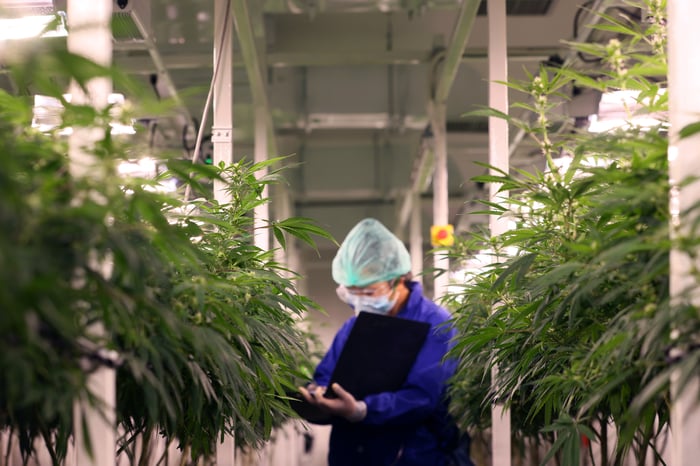Real estate investment trust (REIT) Innovative Industrial Properties (IIPR 4.75%) has been expanding its portfolio at a rapid clip since it went public in 2016. That's partly thanks to the swift growth in the marijuana space, and partly a natural result of the fact that financing options in this emerging sector remain limited due to federal law. Dividend growth investors have benefited mightily so far, and Innovative Industrial just signaled that the growth isn't over yet.
Limited options for tenants pays dividends for Innovative Industrial
One of the biggest supports for Innovative Industrial Properties' business is marijuana's murky legal situation. Yes, more and more states have legalized its use for medical and recreational purposes. But 11 states have yet to climb on the cannabis legalization bandwagon. And at the federal level, there are significant legal issues to contend with that have kept companies in the marijuana sector from accessing traditional funding sources such as banks.

Image source: Getty Images.
That's where Innovative Industrial Properties has stepped in. The REIT uses the sale/leaseback model. It buys assets -- primarily marijuana growth and processing facilities -- and then immediately leases them back to the sellers under long-term contracts. Generally, the terms are for between 15 and 20 years, with the current weighted average lease duration in Innovative Industrial's portfolio sitting at a healthy 16.6 years. In addition to sale-leasebacks, the company also builds facilities from the ground up, but that has historically been a smaller piece of the business.
The REIT uses the net lease model, so its tenants are responsible for most of the costs of the properties they occupy. Each individual asset may be high risk, given that it only has one tenant. However, across a large portfolio -- and Innovative owns just over 100 properties -- those risks, while worth monitoring, become less of an issue.
The big grower
When Innovative Industrial held its initial public offering, it didn't own any properties. So it has been growing at a fairly rapid clip, and income investors who bought in have been well rewarded along the way. In mid-2017, the REIT initiated its quarterly dividends at $0.15 per share. It ended 2021 with a payout rate of $1.50 per share per quarter. That's a tenfold increase, but something changed in 2021 that had dividend growth investors worried.
In September, when announcing another in a string of quarterly dividend hikes, the board stated that it would shift from reviewing its payout levels quarterly to doing so every six months. That hinted that a slowdown in the REIT's dividend growth might be ahead.
To be fair, a REIT can only grow rapidly for so long before its portfolio size starts to become a headwind. Indeed, each new property has less and less of an impact on the portfolio, which is just simple math. But, when Innovative Industrial announced its next dividend (to be paid in April), the payout increase -- from $1.50 to $1.75 -- was a still-generous 17%.
The key thing to note here is that the prior two increases were roughly 6% and 7% each. So the most recent hike took longer to get to given the semi-annual dividend reevaluation, but in the end, it was basically comparable to what might have been expected if it had happened over the course of two quarterly hikes. So, any fears that the decreasing frequency of dividend hikes might portend a material slowdown in overall dividend growth have (thus far) proven unfounded.
Still attractive for dividend growth
As time goes on and Innovative Industrial Properties continues to expand, the relative pace of its dividend growth will have to slow. But for now, the REIT is clearly still rewarding dividend investors with big hikes. Further note that the payout, at current share prices, yields a generous 3.5%, while the average REIT -- based on the benchmark Vanguard Real Estate Index ETF -- has a yield of 2.2%, and the S&P 500 Index yields just 1.3%. For income investors, there's a lot to like here.





